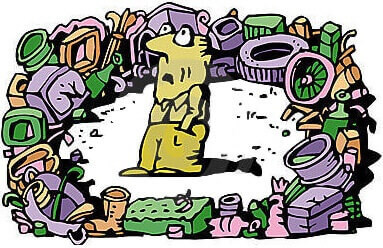Soil pollution may be defined as the contamination of soil with foreign materials which deteriorates the quality, texture and mineral contents of the soil.
Sources of Soil Pollution
Soil pollution is mainly caused by:
- Solid wastes
- Insecticides and weedicides
- Fertilizers and
- Industrial wastes
1. Solid Wastes
The main source of soil pollution is solid waste. Examples of solid wastes are garbage, empty cans, broken furniture, bottles, ash, building materials, radioactive wastes, paper, clothes, leather, plastics etc. Solid wastes generally come from industries, houses, agricultural fields and nuclear reactors.
2. Insecticides and Weedicides
These days, various types of insecticides and weedicides are used to improve agricultural production. When insecticides and weedicides are sprayed over the plants, some part of them gets mixed with soil and cause soil pollution.

3. Fertilizers
Excessive use of fertilizers in modern agriculture also causes soil pollution. Generally, all the fertilizers are non-biodegradable. So, they accumulate in soil and make it toxic.
4. Industrial Wastes
Every year a large amount of solid and liquid wastes is dumped over the soil by various industries. These wastes contain many toxic materials such as lead, mercury, cadmium, cyanides, acids, alkalies etc. Thus, industrial wastes also cause soil pollution.
Test Your Understanding and Answer These Questions:
